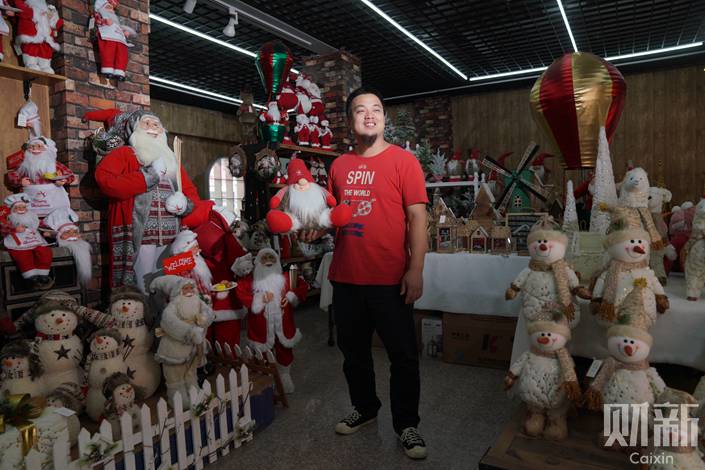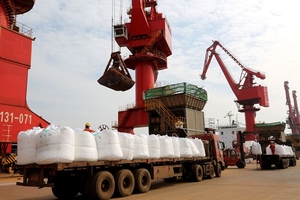Photo Essay: China’s ‘Everyday Item Export Capital’ Retools in Face of Pandemic

One of the world’s biggest export markets for everyday items from plastic flowers to stuffed toys has quietly suffered during the global pandemic, clobbered by a near halt to international travel that is essential for many of its customers. In the face of that challenge, merchants in the eastern export hub of Yiwu are looking for new ways to survive, including a turn to domestic buyers and selling more wares online and at virtual events.
The coastal city in East China’s Zhejiang province has a population of about 2.3 million, a relatively modest size for the nation of 1.3 billion. But it punches far above its weight when it comes to exports. Its Yiwu International Trade City is the world’s largest small-commodity wholesale market, with thousands of stalls showcasing Christmas decorations, U.S. presidential election flags and thousands of other everyday items.
The market normally carries more than 2 million types of goods, with customers from 210 counties and regions around the world. But a big portion of those orders vanished during the pandemic.
One of the many vendors feeling the pinch is Gong Binghang, who has been making artificial flowers for 30 years. In 2019, his company’s revenue totaled around 50 million yuan ($7.46 million), mostly from foreign customers. But this year his business collapsed as most of those were prevented from coming to China starting in March. Gong said his orders through September plummeted 70% from the same period of 2019.
While the pandemic has hammered most of Yiwu’s merchants, a smaller number have managed to find profits by turning to certain products in high demand, such as disinfectants and soap dispensers. One of those is Su Jinyang, who works at Meizhiyuan Cosmetics Co. Ltd., a company that pivoted from its traditional focus on perfumes and started making hand sanitizer instead.
“At peak periods, we could churn out more than 1.2 million bottles of hand sanitizer a day,” said Su. Meizhiyuan produced perfumes for overseas customers for seven years before the pandemic caused its order book to drop to nearly zero. During the Lunar New Year holiday in late January, the perfume-maker decided to switch to its current line of hand sanitizers, which brought in orders worth thousands of dollars in the first half of the year.
“Both perfumes and hand sanitizers use alcohol as a main ingredient,” said Wang Xiaoyan, the company’s deputy manager in charge of product management. “We were familiar with the regulations on storing and transporting hazardous goods, and that’s why we could quickly make a transformation.”
China’s exports of epidemic prevention supplies grew rapidly in the first three quarters. Its textile exports, including masks, rose nearly 40% year-on-year to be worth 829 billion yuan over that period, according to the State Council Information Office.
However, the boom didn’t last long. Some who invested in the market have now begun losing money as foreign demand for epidemic prevention supplies declines, Caixin has learned (link in Chinese). As that happens, many merchants are now turning to e-commerce and even live-streaming platforms to reach customers.
One of those is Yiwu Aoshan Crafts Co. Ltd., which manufactures Christmas goods such as Santa Claus dolls and festive decorations. A little known fact is that up to 80% of the world’s Christmas goods are produced in China, and 80% of those are made in Yiwu, earning the city the name of China’s “Christmas village.”
While Yiwu is typically humming with Christmas business in the middle of the year, the pandemic dealt the business a major blow this year. Responding to the downturn, Aoshan Crafts recently set up its own e-commerce department. Zhang Hongwei, who heads the new department, told Caixin the company has found unexpected demand for its Christmas wares by selling products to domestic buyers.
As merchants gain experience in e-commerce, many are exploring further movement into China’s domestic market despite their lack of familiarity. China has more broadly been encouraging such moves to lessen the country’s dependence on exports for economic growth.
“We had already had a sense of crisis when export orders fell in 2019,” said Wang Qiang, an artificial flower merchant, referring to a sharp downturn his company felt last year before the pandemic. With the rapid approach of “Double 11” — China’s online shopping extravaganza that’s akin to “Black Monday” in the U.S. — Wang decided to turn to livestreaming platforms to market his products. Sitting in front of a microphone and turning on his self-engineered spotlights, Wang places his phone on a selfie stick as he prepares to host his first-ever livestream show.
 |
Workers keep busy on an assembly line making hand sanitizers on Sept. 21 at a workshop owned by Meizhiyuan in Yiwu, East China’s Zhejiang province. In late January, the company switched from its original perfume line to produce hand sanitizers, taking in thousands of dollars in the first half of the year. Photo: Liang Yingfei/Caixin |
 |
Neck pillows waiting for buyers pile up on Sept. 22 in a corner of a workshop. Photo: Liang Yingfei/Caixin |
 |
A worker prepares to move a canvas print onto a wooden frame. This product became popular among customers in Europe, the U.S. and the Middle East during the pandemic. Photo: Liang Yingfei/Caixin |
 |
A worker paints artificial plants green. Photo: Liang Yingfei/Caixin |
 |
A wigmaker works at a factory, whose businesses involving Halloween costumes and cartoon wigs were not hurt too badly by Covid-19. Photo: Liang Yingfei/Caixin |
Contact reporter Wang Xintong (xintongwang@caixin.com) and editor Yang Ge (geyang@caixin.com)
Download our app to receive breaking news alerts and read the news on the go.

- MOST POPULAR






